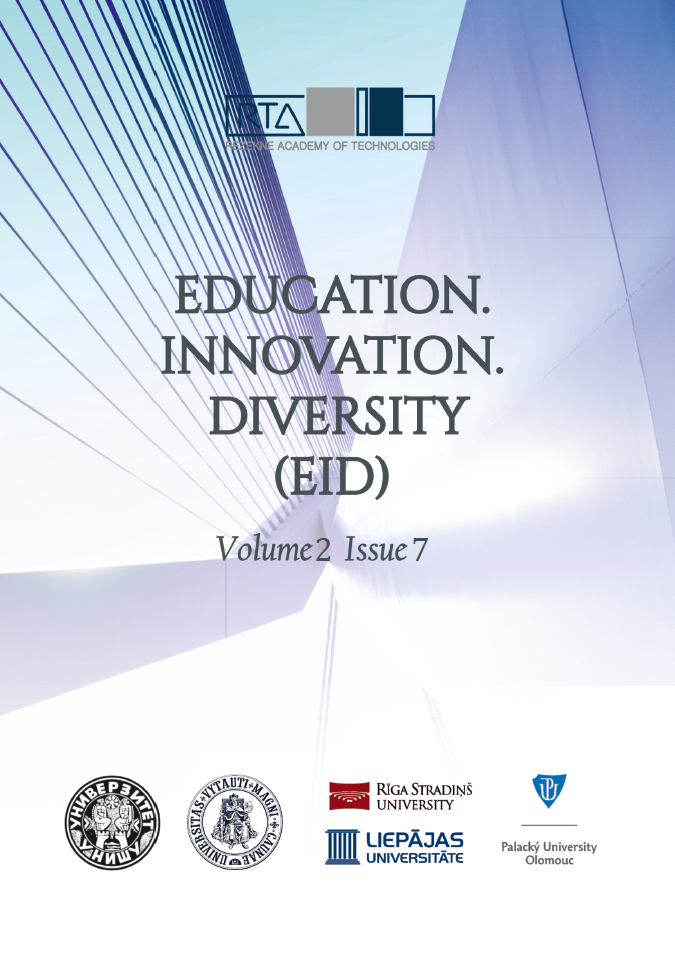A SCHOOL PRINCIPAL AS A CHANGE LEADER IN EDUCATION
DOI:
https://doi.org/10.17770/eid2023.2.7352Keywords:
change leader, leadership, school principalAbstract
Successful school management, whose "comprehensive content" includes both administrative and pedagogical aspects, is a decisive factor for the implementation of change in teaching and learning, promotion of pupils' learning achievements and the improvement of the quality of education in general. However, the role of school principal as a change leader gets increasingly emphasized as opposed to traditional principal's role of administrator or manager.
This study focuses on the personal experience of school principals and interpretation of their experience, reflecting the principals' understanding of the role, nature and essence of leadership as an aspect of school management. This is a phenomenological research study. Research sample: the principals of general education schools (N=9). The aim of the study is to explore principals' understanding of what it means to be a change leader in a school, what leadership functions are prioritized, and how school principals balance their leadership functions with those of administration and management.
The data have been gathered using semi-structured interviews. The results of the study indicate that the implementation of school principal’s role as a change leader is facilitated by: 1) awareness of one's personal qualities; 2) delegation of responsibilities; 3) strengthening of the school culture and its values; 4) implementation of a personalized approach highlighting the individual abilities of each teacher in the organization; 5) strengthening of the school as a “learning organization”.
References
Bøje, J. D. & Frederiksen, F., L. (2021). Leaders of the profession and professional leaders. School leaders making sense of themselves and their jobs. International Journal of Leadership in Education, 24(3), 291-312. DOI: https://doi.org/10.1080/13603124.2019.1591515
Butkeviča, A. & Zobena, A. (2017). Teacher Leaders as Agents of Innovation Diffusion. In Dišlere, V. (Ed.), 10th International Scientific Conference on Rural Environment, Education and Personality (REEP): Vol.10. Rural environment, education, personality (pp. 56-62). Latvia University of Agriculture.
Choi, A. & Gil, M. (2017). Does school leadership affect student academic achievement? Barcelona: Fundació Jaume Bofill, Ivàlua
Connolly, M., James, C., & Fertig, M. (2019). The difference between educational management and educational leadership and the importance of educational responsibility. Educational Management Administration & Leadership, 24(4), 504-519, DOI: https://doi.org/10.1177/1741143217745880
Daniels, E. Hondeghem, A., & Dochy, F. (2019). A Review on Leadership and Leadership Development in Educational Settings. Educational Research Review, 27(3), 110-125, DOI: https://doi.org/10.1016/j.edurev.2019.02.003
Ganon – Shilon, S., Shaked, H., & Schechter, C. (2020). Principals’ voices pertaining to shared sense-making processes within a generally-outlined pedagogical reform implementation. International Journal of Leadership in Education, 22(3), 354-369, DOI: https://doi.org/10.1080/13603124.2020.1770864
Ganon-Shilon, S. & Schechter, C. (2019). School principals’ sense-making of their leadership role during reform implementation. International Journal of Leadership in Education, 22(3), 279-300, DOI: https://doi.org/10.1080/13603124.2018.1450996
Geske, A. & Rečs, N. (2019). The Impact of Headmaster’s Leadership Practice on the Formation of a Professional Learning Community at School. Society. Integration. Education, 2, 90-105, DOI: https://doi.org/10.17770/sie2019vol2.3816
Gerpott F. H, Fasbender U., & Burmeister A. (2020). Respectful leadership and followers’ knowledge sharing: A social mindfulness lens. Human Relations, 73(6), 789-810, DOI: https://doi.org/10.1177/0018726719844813
Golubeva, A. (2010). Studiju programmas direktora kā vadītāja darbības kompetence un profesionālā pilnveide (Competence and Professional Development of Study Program Director as Manager). [Doctoral dissertation, University of Latvia]. Retrieved from: https://dspace.lu.lv/dspace/handle/7/5058
Halaychik, C. S. (2016). Lessons in Library Leadership. A Primer for Library Managers and Units Leaders. Chandos Publishing. DOI: https://doi.org/10.1016/B978-0-08-100565-1.00001-7
Hauge, K. (2019). Teachers’ Collective Professional Development in School: A Review Study. Cogent Education, 6(1). DOI: https://www.tandfonline.com/doi/full/10.1080/2331186X.2019.1619223
Izglītības Pētniecības institūts (2019). Starptautiskā mācību vides pētījuma OECD TALIS 2018 rezultāti: skolotāji un skolu direktori – kvalifikācija, nodarbinātība un slodze, darbā ievadīšana un profesionālā pilnveide [Results of the international education environment study OECD TALIS 2018: teachers and school principals - qualification, employment and workload, induction and professional development]. LU, PPMF, Izglītības pētniecības institūts. Retrieved from: https://www.ipi.lu.lv/fileadmin/user_upload/lu_portal/projekti/ipi/Publikacijas/TALIS2018ZinojumsB.pdf
Kasprzhak, A., Filinov, N., Bayburin, R., Isaeva, N., & Baysik, N. (2015). School Principals as Agents of the Russian Education Reform. Voprosy Obrazovaniya/ Educational Studies Moscow, 2015(3), 122-143. DOI: 10.17323/1814-9545-2015-3-122-143
McCaffery, P. (2018). The Higher Education Manager’s Handbook. Effective Leadership and Management in Universities and Colleges. London: Routledge. DOI: https://doi.org/10.4324/9781351249744
Msila, V. (2019). School Leaders and the Pursuit of Effectiveness: Envisioning Schools that Endure Change. Edulearn19 Proceedings, 2314-2320. DOI: https://doi.org/10.21125/edulearn.2019.0629
Northouse, P.G. (2016). Leadership: Theory and practice. Thousand Oaks, CA: Sage Publishers, Inc. Retrieved from: https://fliphtml5.com/lnym/ezlr/basic/51-100
OECD (2016). School Leadership for Learning: Insights from TALIS 2013. TALIS, OECD Publishing, Paris. DOI: http://dx.doi.org/10.1787/9789264258341-en
OECD (2019). TALIS 2018 Results. Teachers and School Leaders as Lifelong Learners. Vol. I, TALIS, OECD Publishing, Paris. DOI: https://doi.org/10.1787/1d0bc92a-en
Rečs, N. (2020). Direktora vadības prakses ietekme uz profesionālās mācīšanās kopienas veidošanos skolā (The Impact of Principal`s Leadership Practice on the Formation of the Professional Learning Community at School). [Doctoral dissertation, University of Latvia]. Retrieved from: https://dspace.lu.lv/dspace/handle/7/50258
Saleniece, I., Namsone, D., Čakāne, L., & Butkēviča, A. (2019). Towards a context-specific school leadership competence framework: a case study of Latvia. In: Daniela L. (Ed.), Inovations, Techologies and Research in Education. Proceedings of the ATEE spring conference, 2019 (pp. 483-497). University of Latvia Press. DOI: https://doi.org/10.22364/atee.2019.itre.35
Schleicher, A. (2015). Schools for 21st-Century Learners: Strong Leaders, Confident Teachers, Innovative Approaches, International Summit on the Teaching Profession. OECD Publishing. DOI: http://dx.doi.org/10.1787/9789264231191-en
ten Bruggencate, G. C., Luyten, J. W., Scheerens, J., & Sleegers, P. J. C. (2012). Modeling the influence of school leaders on student achievement: How can school leaders make a difference? Educational Administration Quarterly, 48(8), 699-732. DOI: https://doi.org/10.1177/0013161X11436272
Valsts izglītības satura centrs (2017). Skola2030. Izglītība mūsdienīgai lietpratībai: mācību satura un pieejas apraksts [School2030. Education for Modern Expertise: Description of Educational Curriculum and Learning Approach]. Projekta Nr. 8.3.1.1./16/I/002 “Kompetenču pieeja mācību saturā” materiāls sabiedriskai apspriešanai. Rīga, VISC. Retrieved from: https://skola2030.lv/admin/filemanager/files/2/prezentacija_izgl_musdienigai.pdf
Downloads
Published
Issue
Section
License
Copyright (c) 2023 Education. Innovation. Diversity.

This work is licensed under a Creative Commons Attribution 4.0 International License.






